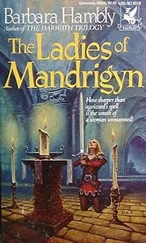Please, God, no, Dolley whispered. Dearest God, hold him safe in Thy hands.
Horsemen clattered up beside the carriage, the blue of the leader’s militia jacket barely visible through the dust. Joe reined in and Dolley put down the window, her hands trembling so badly they could barely work the catches. One of the men she recognized as John Graham, who had been a clerk with the State Department when Jemmy had taken it over—he was Chief there now.
“Where is he?” She thrust open the door, staggering as she stepped down into the road.
“We don’t know, ma’am. But General Winder was defeated. The whole Army’s in flight—”
He’ll go to the Mansion and be captured. I knew I should not have left.
“Hast heard anything?” Her voice cracked. “Mr. Graham, take me back to the Mansion. I shan’t leave him—”
“Mrs. Madison, your being taken will serve him no good—”
“It will if he be taken as well!” She almost screamed the words at him, the whole weight of the day suddenly falling on her, like a dam giving way all at once before the pressure of a flood. Her whole body shook. “I will not leave him! Take the things on to Georgetown, but let me go back!”
“There is no going back,” said Graham.
Sukey scrambled from the carriage-box and took her other arm, said with surprising gentleness, “Ma’am, he’s right. You can’t—”
Like the rolling boom of thunder, an explosion cut across her words. All of them swung around, looking toward the south. Black smoke rolled toward the storm-blackening sky. Even at this distance, Dolley could see in it flickers of flame.
“It’s the Navy Yard,” said Graham. “Secretary Jones ordered its destruction, to keep our powder and ships out of the hands of the British.”
Dolley stood for a long moment, watching the smoke and the flame, as another explosion echoed across those flat green marshes, the scattered buildings and cut-down stumps that made up the Republic’s capital. Refugees jostled around them, poured like a dirty river along the road to Georgetown.
More quietly, Graham repeated, “Ma’am, there is no going back.”
Dolley let herself be coaxed back into the carriage. Joe whipped up the horses; they clattered on their way.

Sophie Hallam was still at the Executive Mansion when James Madison stumbled up the front steps. French John, with Pol in her cage and a bottle of the Madisons’ best champagne in either coat-pocket, had departed shortly after four, and immediately thereafter looters had broken in, helping themselves to whatever Dolley had left. Sophie had simply retreated to the yellow parlor and seated herself by the window with a pistol and a bottle of champagne—after all, these men and women had presumably paid the taxes that purchased the silver candlesticks and bottles of port and cognac.
She was still there, and the last of the shouting was just dying down in the hall, when she heard Paul Jennings gasp, “Mr. Madison, sir!”
Stepping quickly through the parlor door she saw the little white-haired gentleman stagger, then sink onto one of the hall benches as if he’d been shot. The men with him crowded around, supporting him and jabbering, Sophie thought, like so many frightened monkeys. She crossed unhurriedly to the dining-room, poured a glass of champagne, and brought it back out.
“Drink this, sir.”
The thin white fingers could barely keep a grip around the stem, but he glanced up and met her eyes and there was nothing weak or beaten in his sharp glance. “Mrs. Hallam.” He shook the others off him—the senior Charles Carroll, whose son had so recently hustled Dolley out of the Mansion, and one of his generals—and stood to bow.
“Mrs. Madison left safely about half an hour ago,” reported Sophie calmly—she had always liked Mr. Madison. “And as you see—” She gestured at the shadowy front hall, strewn with Dolley’s dresses and shawls, with broken china and sweetly reeking puddles of spilled wine, “—the looters were a bare ten minutes behind.”
“I hope you managed to secure something worthwhile for yourself, ma’am?”
“Only memories.”
“Ah.” Madison sank back onto the bench, closed his eyes. “A woman of discernment.” His black clothing was gray with dust, his white hair and dead-white exhausted face, blackened with powder-smoke.
“Dolley, on the other hand, carried off all the Cabinet papers, a small clock, General Washington’s portrait, and the drawing-room curtains, so as you see, she exhibited more discernment than I. Will you lie down, sir?”
“Lie down?” exploded old Mr. Carroll. “Dammit, woman, the British are on our heels—!”
“I see no sign of them on the Avenue,” Sophie retorted coolly. “And I believe Mr. Madison would be the better for twenty minutes’ rest.”
“The lady is right, sir,” affirmed Mr. Barker, kneeling to hold the wineglass again to Madison’s lips. “I think those louts about cleared out the cellar, sir, but I’ll have a look round for cognac if thou’rt mindful for it.”
Madison shook his head. “I see things have much changed since the days of the Revolution,” he murmured. “I would not have believed the difference between a militia force and regulars, had I not seen it today.”
“I think it’s the British who have changed, sir,” replied Sophie. “Since last Americans fought them, they have sharpened their steel against Napoleon. And the generation that has grown up here since that time has done nothing but call one another names.”
“They’ll rally,” said the General bracingly. “Of course they’ll rally. And men will come into the city to defend it—”
Madison lifted his fingers, shook his head without opening his eyes.
After a moment, Sophie said, “Mrs. Madison has gone on to Bellevue with your son, Mr. Carroll.”
“Too close,” Madison breathed. “The British will pass over this city like breaking surf and follow our troops on into Georgetown. Will you be going out there, too, Sophie?”
“Later, yes.”
“I must find General Winder—rally the men. Keep the government together.” He drew a deep breath and coughed, flinching with pain. Sophie, who had sat with Abigail Adams through bouts of her rheumatism, knew just how agonizing was that net of fire that seemed to clothe bone and muscle beneath the skin. “Should you see my wife before I do, let her know we’ll rendezvous at Salona Plantation. It’s ten miles up the river and she should be safe there.”
“You should rest,” said Sophie again, and the old man waved slightly, brushing the suggestion away.
“Since first the British learned they could not hold us by force,” he said, “they’ve been trying to hold us by other means: all the usual tricks that the strong play on the weak. Debt. Extortion. Isolating us from support elsewhere. Bullying. There always comes a time when the bullied must hold the line and say, No more. There is never any going back, but what we strive for now is to choose our own path forward, not the path that is most convenient for the merchants and bankers who surround the English King.
“They could not conquer us before but they can break us apart. Once union is sundered—once the government centered in this city shatters—we can be dealt with piecemeal. Each State will go back to being England’s handmaiden, now that France and Spain are broken. Sending our men to die in wars of her choosing; paying money to her rather than investing it in ourselves. Tonight—and in the next few weeks—we will need to hold fast.”
He sighed, and sat up. An unlikely-looking kingmaker, thought Sophie, to have maneuvered first Washington and then Jefferson into leading the raw new nation in the direction he believed that it should go.
Читать дальше






